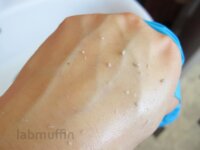I hope you enjoyed my guest week! I’m back today with some hardcore beauty science, looking at the fascinatingly confusing world of perfumery.
 |
| Do you love the smell of roses? It may reveal more about you than you think! |
People have been using perfumes for over 5000 years. But what makes one person like a scent and another hate it, or why scents can smell completely different on different people, is still a bit of a mystery. Obviously, personal aesthetic tastes are very important – some people just like certain smells. But interestingly, biology and genetics contribute too!
Genetics and BO
A lot of what we are is simply genetically inborn, and it turns out that your natural scent, and what smells you like, is also partly determined by your genes. In particular, the MHC genes are important in smell. These are a group of genes which play a major part in determining how your immune system works. A bunch of different types exist, and the one you possess influences your body odour, as well as what scents you find attractive.
You may have heard of the famous sweaty shirt study, where a group of men wore the same T-shirt for a week, and women were then asked to smell each shirt and rate them on their, um, aroma. Turns out that the women tended to like the scent (stench?) of men whose MHC genes were dissimilar to theirs. The biological reasoning for this is that if you breed with someone whose MHC genes are different from yours, your children will have a stronger immune system. (*It gets more interesting when it comes to women on the pill, but kind of off-topic – see the footnote at the bottom for more.)
 |
| “Closeup of young man sniffing his armpit isolated on white background” – maybe he’d be less isolated if he had some deodorant. |
Moving quickly from BO…
When it comes to perfume, however, a 2001 study by Wedekind and Milinski found that there was no correlation between the scents you’d like on a potential partner and your MHC genes – instead, it turns out that it’s the scents you’d pick for yourself that correlate. In particular, the study subjects’ perceptions of musk, rose and cardamom notes were correlated with MHC genes, while castoreum and cedar were not.
A more recent 2012 paper also reported the same findings – that scent preferences correlate with a person’s MHC genes. Additionally, they found that when people sniffed scents paired with sexually connotated images, their preferences changed significantly from when they sniffed the perfumes while looking at sterile perfume bottles, which suggests that scent has something to do with sexual attraction.
What does this all mean?
A proposed biological explanation is that humans pick perfumes to meld pleasingly with their natural odour and help it carry further, to advertise their immune profile, in a process referred to as “synergistic amplification”. This is the complete opposite of the more commonly advertised use of scent – to mask natural odours!
It’s common advice that you should try a perfume on your skin before buying it, not just sniff it on a strip of paper. The same perfume can smell completely different on two individuals – the difference is usually explained by the vague, hand-wavy term, “body chemistry”, which now seems to be more specifically related to MHC genes.
The genetic connection also might explain why fragrance is less susceptible to fashion trends than other types of cosmetics – a handful of 90-year-old fragrances are still selling very well, and many new perfumes are similar to successful older releases. You might be a slave to the latest colour trend, but your MHC genes won’t change!
Some perfume companies have caught on to the science – fragrance giant Coty bought a patent for specific MHC-related peptides in 2009.
Handy tips
– Buying perfume for your significant other based on what you like will probably be a fail. It’s best to leave perfume buying alone, unless they’ve told you specifically what they like! If you must buy perfume, buying for a close relative of the same gender will be your best bet.
– If someone likes a perfume you hate, it’s probably not because they’re a fart-sniffing dingbat (though that’s always a possibility). Conversely, if you find an experienced perfume reviewer who likes a few scents you like, stalk their other recommendations!
*Interestingly, women on oral hormonal contraceptives (the pill) were found to have the opposite preference – they preferred the smell of men whose genetic MHC profile was similar to their own. This could have implications for women who meet their partner while on the pill, then going off it to have kids – one psychologist even goes so far to suggest that this is responsible for the increasing divorce rate since the oral contraceptive pill was introduced. A low-risk way of thwarting this possible effect: go off the pill for a few months before marriage or trying for kids.
References
Open access, light-ish reading:
FB Furlow, The smell of love, Psychology Today, 1996.
E Svoboda, Scents and sensibility, Psychology Today, 2008.
Original articles:
C Wedekind, T Seebeck, F Bettens and AJ Paepke, MHC-dependent mate preferences in humans, Proc Biol Sci 1995, 260, 245-249.
M Milinski and C Wedekind, Evidence for MHC-correlated perfume preferences in humans, Behav Ecol 2001, 12, 140-149.
A Hämmerli, C Schweisgut and M Kaegi, Population genetic segmentation of MHC-correlated perfume preferences, Int J Cosmet Sci 2012, 34, 161-168.







HAHA! I love this. The footnote is brilliant. Luckily I wasn’t on the pill before I met my man. . lol great post Michelle! I love your humorous side to it!
Thanks Mel! 🙂
Tips for buying perfume for Michaela:
1) Find the most expensive perfume.
2) Purchase.
3) Lather, rinse, repeat 😉
4) eBay if unwanted for profit!
The birth control thing is really interesting! Great post, and I appreciated the stock photo of the guy smelling his own armpit probably more than I should have. 😛
It’s fascinating how everything affects everything else! And yes, I included that photo For Her Pleasure 😉
I’ve read about the t-shirt study before, but had no idea genetics were so strongly involved in what I like on myself. Fascinating stuff!
It is! Psychology be cray.
this is so interesting, especially the part about the pill!
It really is! Brains are weird things!
I’ve read most of this information before, but it never ceases to intrigue me! =)
Me too, it’s so interesting how many external factors subconsciously influence our decisions!
Very interesting post! Thanks for sharing your knowledge!
This would ensure excellent performance balance and long lasting strength. The renewed devices are retested Buy Diclazepam different instances, and if the working is found efficient, they are washed, loaded and provided for sale with proper servicing and service agreements and guarantee.
Its such a aggressive things have to share and custom essay writing service also helpful in studies online. Science to be part of lifes.
Nice to be visiting your form again, it has been months for me. http://supreme-essay.net
This is really interesting post,thanks for sharing this information.